Faith
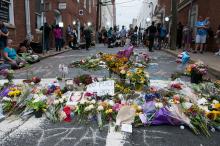
Scores of clergy have signed their names to statements opposing the white nationalist groups’ values. They have planned community prayer vigils celebrating diversity and advocating for unity. And, ahead of [the] Oct. 28 protest, they have sent a strong message that hate is not a religious value.

Overall, giving to religious causes amounted to close to a third of all charitable giving in 2016, Giving USA says. Religious institutions received $122.94 billion that year, or 32 percent of charitable donations. That figure is more than double the amount received by educational institutions, the next highest sector within nonprofits, which garnered $59.77 billion.

The right of Jehovah’s Witnesses to adhere to their faith’s rejection of military service — they believe their allegiance is to God alone — is recognized in the U.S. and other Western countries. But Tajikistan has no law concerning conscientious objectors.
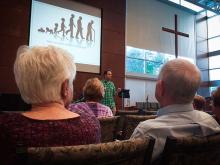
“A lot of times churches are trying to preserve the legacy of who founded the congregations founded long ago,” said Elizabeth Eaton, the presiding bishop of the ELCA. “When you try to hold on to something so tightly, you strangle it. Taking a risk while being faithful to the core message of grace is my advice.”

More than 60 years ago, the divinity school denied him admission because he is black. Speaking at a service in Goodson Chapel, he asked: “What is it that God would have Duke Divinity School do in light of that history? For if one is not honest about that history, one can’t be fully present.”

“I have a religion — but you will call it blasphemy,” he wrote in a letter in 1865. “It is that there is a God for the rich man but none for the poor … Perhaps your religion will sustain you, will feed you — I place no dependence in mine. Our religions are alike, though, in one respect — neither can make a man happy when he is out of luck.”

Yet this administration’s guidelines would allow businesses and government employees to pick and choose who they will serve. As a pastor, I have to ask: What religion champions spitting in people’s faces rather than turning the other cheek? How is God’s love shown through public humiliation, hate, or depriving LGBT people of a job or services?

The 2,000-year-old Coptic Church of Egypt has a long tradition of hallowing those who died affirming their faith in the face of violence.
But the group that calls itself the Islamic State has launched waves of attacks on the Coptic community in recent years – claiming at least 70 lives and wounding scores of others – an unrelenting assault that has opened a debate in the community about martyrdom.
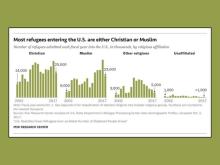
As the Trump administration continues to enforce a travel ban affecting six Muslim-majority and other countries, a Pew Research Center report tracking the influx of displaced people finds that 47 percent of refugee arrivals in fiscal 2017 were Christian and 43 percent were Muslim.
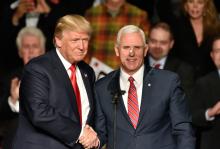
Mike Pence is following President Trump, but he is utterly failing at following Jesus.
Mike Pence’s actions during the football game had nothing to do with the love and justice Jesus calls his followers to strive for.
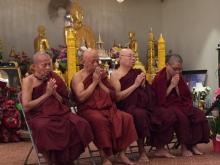
“We always know we need God,” he said, walking back and forth by an elevated slender podium, a microphone headset catching his every word. “But if there ever was a week when we really know we need God, this has been that week.”
Seven days ago — though most people here said it felt much longer — Stephen Paddock shot hundreds of people from the 32nd floor of the Mandalay Bay Hotel before shooting himself. Fifty-eight people were killed — most of them tourists — and almost 500 were wounded.

Starting in the suburb of Ruiru, about 19 miles north of Nairobi, the train for the past five years has informally hosted a growing number of self-styled pastors and a makeshift, moving congregation eager to hear the gospel.
At least two coaches turn into “churches” each day, with Christians singing, dancing, and clapping as they prepare for a short sermon during the one-hour journey.
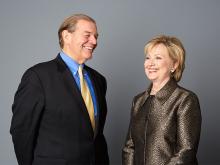
How would you describe Clinton’s faith? What are your impressions of her religious and spiritual life?
She’s a very deeply committed Christian. I know many people are critical of that and don’t believe it, but in my heart of hearts, from the conversations that we have had and from the good that she does, she’s a deeply committed disciple of Christ. And she’s a good Methodist. Methodists don’t talk about their faith very much. She doesn’t wear her religion on her sleeve, but I know that she practices it and she has spiritual disciplines, including reading the Scriptures every day and praying every day. People aren’t going to want to believe that, but it is true.

Liberty and freedom aren’t fancy words or individual guarantees. They’re a process that requires everyone’s participation. We can’t have liberty and justice for all until we’re willing to see the injustice and the lack of liberty all around us, and commit ourselves to doing something about it.
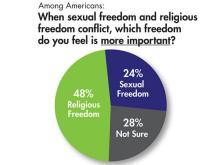
Researchers also asked about what people think motivates religious believers who oppose sexual freedom. Almost half — 49 percent — said faith is the motivator. A fifth — 20 percent — said the motivator is hate. Another 31 percent were not sure.

Film critic Alissa Wilkinson writes that “Christian theology is rich and ... full of imagination that's broad enough to take up residence among all kinds of human cultures. It contains within itself the idea that art exists as a good unto itself, not just a utilitarian vehicle for messages.” The Wedding Plan is a prime example of this kind of religious art. It’s a message movie, a window into a culture that makes the specific and personal universally relatable, and still manages to tell a good story.
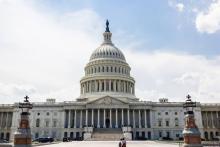
Power can be transformative, but only if power is suffused with love. As Andy Crouch has written, “Power at its worst is the unmaker of humanity—breeding inhumanity in the hearts of those who wield power, denying and denouncing the humanity of the ones who suffer under power.… Power, the truest servant of love, can also be its most implacable enemy.”

“If I’ve got money, and it’s easy for me to get over and give them money, I do,” Thun said. “What the Lord taught me is, I have a responsibility to give. What they choose to do with the money is between them and the Lord, and he can work with them in regards to stewardship.”

A new study shows there may be more than twice as many atheists in the U.S. than previous studies have found.
The report by two University of Kentucky scholars suggests that because people may be embarrassed to admit they don’t believe in God, the number of Americans who say they are non-believers may be artificially low. Polls from Gallup, Pew, and Barna have reported that number between 3 and 10 percent.

Throughout the history of theology, Mix said, Christians have swung between the idea that Earth can be the only inhabited planet because God favors humans, and its counterpart, that to assume Earth is the only inhabited planet is the height of human pride because God is limitless and all-powerful.